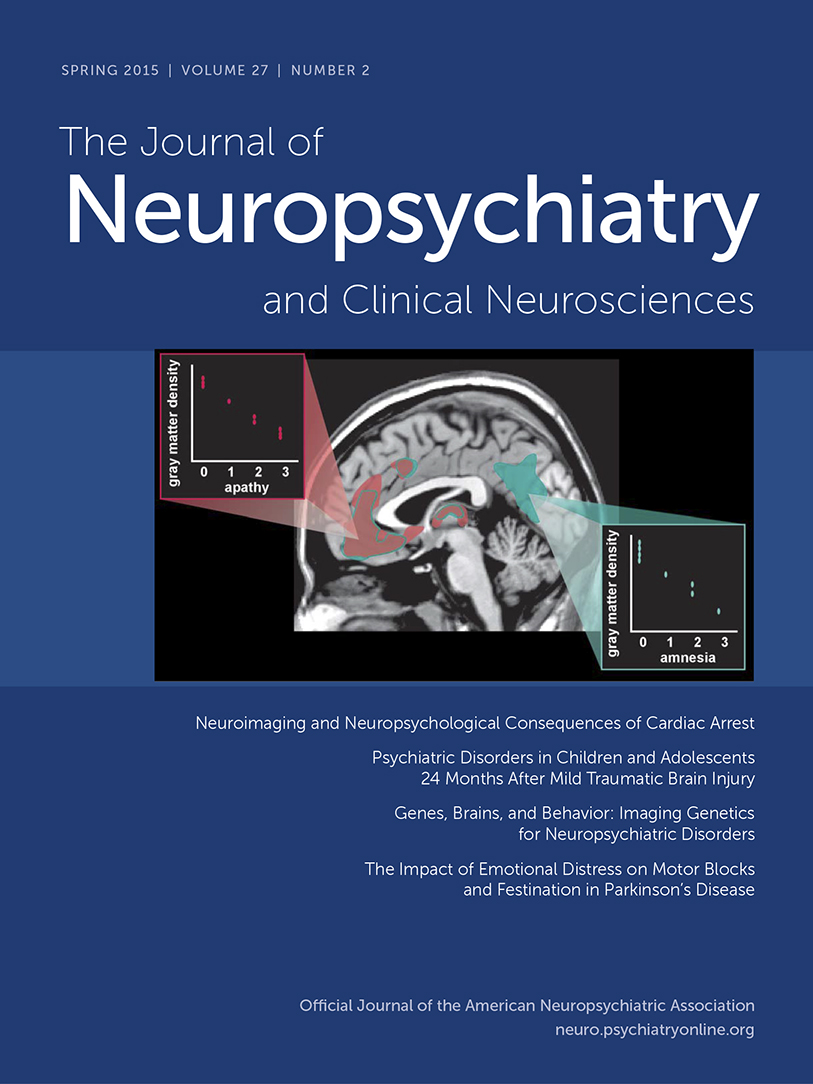Man in the Mirror: Delusion of Misidentification in Down’s Syndrome With Alzheimer’s Disease
To the Editor: The prevalence of Alzheimer’s disease in individuals with Down’s syndrome rises with increasing age, from 1% to 2% in their 30s to 40% in their 50s to 75% at age >65 years.1 Although the significance of neuropsychiatric symptoms in individuals with Down’s syndrome and Alzheimer’s disease has been noted in the literature,2 there is little evidence on effective management. We describe presentation and treatment of a patient with mirrored-self misidentification delusion, which is unusual in individuals with Down’s syndrome with Alzheimer’s disease.
Case Report
A 53-year-old man, with known trisomy 21 and mild-moderate learning disability, developed forgetfulness, psychotic symptoms, and decline in functional abilities 11 months before presentation. The patient believed that his reflection was a stranger, imitating and following him around. His family covered all of the mirrors at home and lessened his outings, because the mirrors on the car and streets agitated him. He complained that the “man in the mirror” had stolen his belongings and he called the local police a number of times to check on the intruder. The patient also experienced visual hallucinations and was seen playing with imaginary babies. He required full assistance, although he was previously independent for his daily activities. His medical history included diabetes mellitus.
An examination revealed Down’s syndrome facial features (upward slanting eyes, flat nasal bridge, short neck, and low-set ears), poor orientation to time, visuospatial deficits, apraxia, and decreased speech output. An MRI brain scan showed advanced cerebral atrophy with severe bilateral hippocampal atrophy. Routine blood tests were unremarkable.
The patient was started on risperidone 0.25 mg/day; after 4 weeks, this was increased to 0.5 mg/day. The family noticed that the patient was no longer bothered by the man in the mirror, was calmer, and rarely experienced visual hallucinations. The patient was started on donepezil 5 mg once daily. He had no side effects except for loose stools a few times a week. He was noticed to be more alert, would ask for tea, and was able to locate and use the toilet.
Discussion
Our patient presented with cognitive deficits and psychotic symptoms from the initial stages of illness and rapidly declined. The suggestion that delusional patients have a more accelerated form of Alzheimer’s disease has only been supported in relation to patients with misidentification delusions who have an exaggerated Alzheimer’s disease pathology in the hippocampal region and projection zones as well as more marked deficits in global cognitive function.3
Subjects with Down’s syndrome and dementia demonstrate various types of misidentification delusions except for a mirrored-self misidentification delusion, and these delusions are reported to be more prevalent in the mid- to later stages, persistent, and less amenable to correction, unlike in our patient.2 However, visual hallucinations are common in Down’s syndrome with dementia and misidentification delusions, as seen in our patient.2
There is evidence that visual hallucinations and delusions associated with agitation in Alzheimer’s disease respond better to risperidone,4 and this was effective in our patient. In addition, a response to donepezil was in agreement with modest evidence showing that donepezil favors individuals with Down’s syndrome and Alzheimer’s disease who are able to tolerate the drug.5 Better understanding of the progression of Alzheimer’s disease in individuals with Down’s syndrome is essential to improve diagnosis and treatment and thereby contribute to better quality of life for affected individuals and those concerned about them.
1 : Population-based study of the prevalence and presentation of dementia in adults with Down’s syndrome. Br J Psychiatry 1998; 172:493–498Crossref, Medline, Google Scholar
2 : Psychiatric symptoms in adults with Down syndrome and Alzheimer’s disease. Am J Intellect Dev Disabil 2010; 115:265–276Crossref, Medline, Google Scholar
3 : Increased striatal dopamine (D2/D3) receptor availability and delusions in Alzheimer disease. Neurology 2009; 72:528–534Crossref, Medline, Google Scholar
4 : The efficacy and safety of risperidone in the treatment of psychosis of Alzheimer’s disease and mixed dementia: a meta-analysis of 4 placebo-controlled clinical trials. Int J Geriatr Psychiatry 2007; 22:475–484Crossref, Medline, Google Scholar
5 : Donepezil for dementia in people with Down syndrome. Cochrane Database Syst Rev 2009; (1):CD007178Medline, Google Scholar



